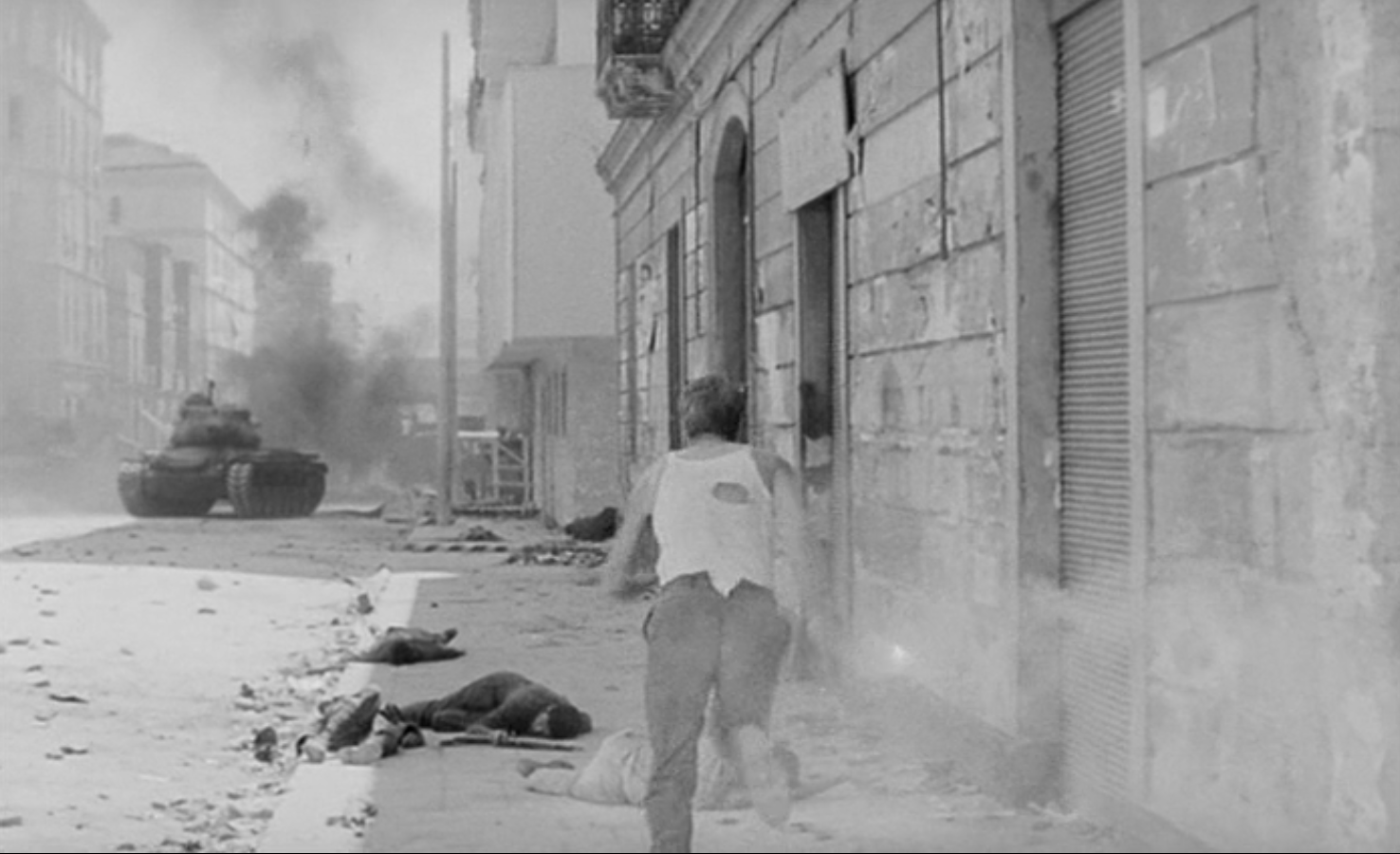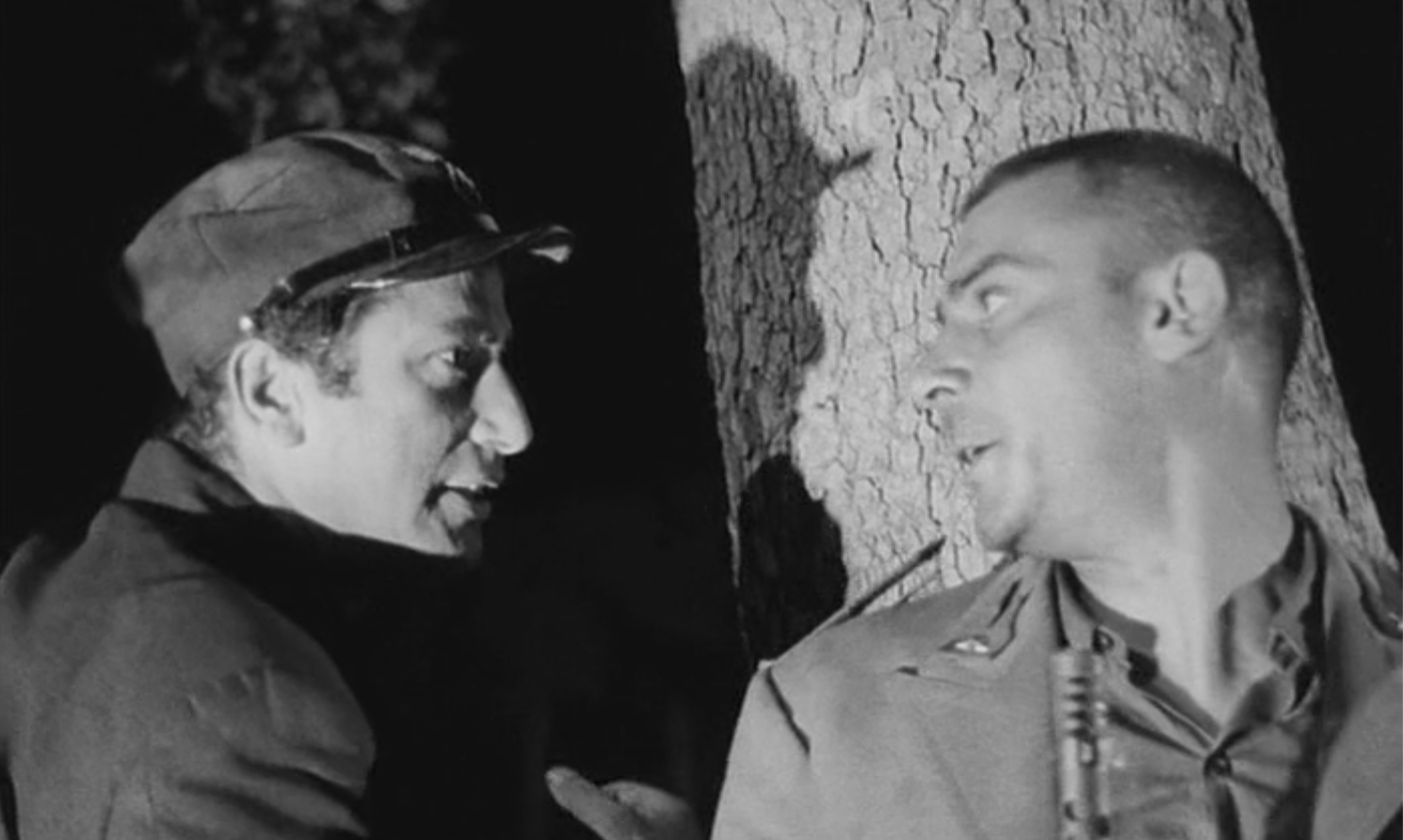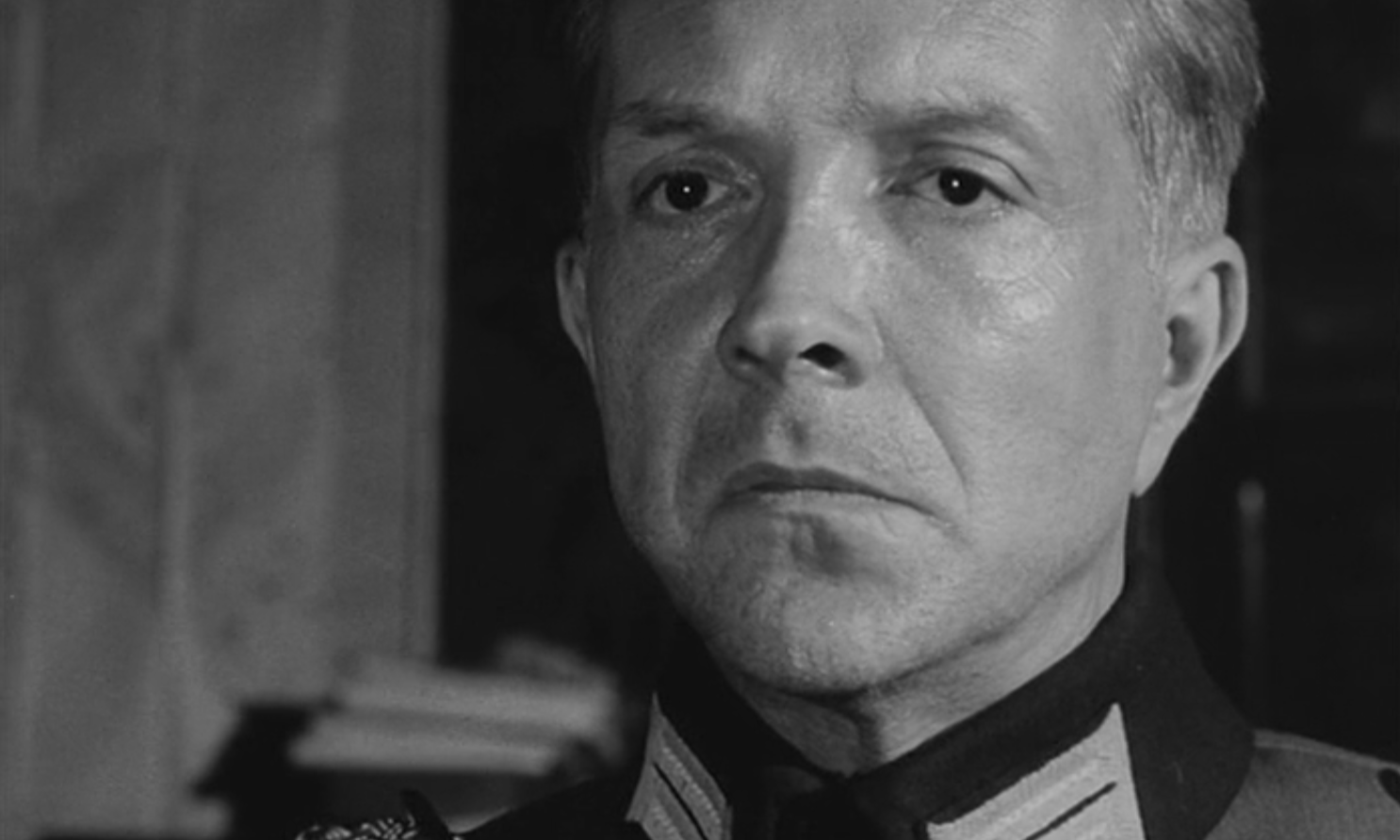Regia / Director: Nanni Loy, 1962
Gennarino giace morto in strada e i carri armati continuano a sparare. "L'hanno ucciso!"
La furia cresce tra i combattenti italiani.
"Bruciamo tutto!"
Gennarino lies dead in the street and the tanks continue firing. “They’ve killed him!”
Fury is building within the Italian fighters.
“Let’s burn everything!”
Finalmente un uomo corre verso i carri armati, con una granata in mano. I suoi compagni lo guardano ansiosi mentre corre saltando i corpi stesi sul marciapiede. Notiamo lo stupore e la tenerezza delle loro espressioni.
At last, a man runs towards the tanks, grenade in hand. His comrades watch anxiously as he runs, jumping over the bodies lying on the sidewalk. We note the wonder and tenderness of their expressions.
Avvicinandosi al carro armato, il napoletano lancia la granata. Subito il veicolo viene avvolto da fumo e fiamme. Con la schiena schiacciata contro un edificio, l’uomo grida: "Ora siamo tutti giganti!"
Closing in on the tank, the Neapolitan tosses the grenade. At once, the vehicle is engulfed in smoke and flames. Back pressed against a building, the man yells, “Now, we’re all giants!”
Un portello si apre e i soldati tedeschi escono dal veicolo, avvolti dal fumo.
A hatch opens, and German soldiers emerge from the vehicle, enveloped in smoke.
"Andiamo!" Insieme, gli italiani corrono lungo la strada, con le armi pronte, verso la prossima battaglia.
“Let’s go!” Together, the Italians run down the street, arms at the ready, on to the next battle.
Nell'oscurità, vediamo i fari luminosi di una jeep su una strada alberata. Improvvisamente degli spari colpiscono il veicolo: un gruppo di combattenti italiani è accovacciato sul marciapiede, nell'ombra.
In the darkness, we see the bright headlights of a jeep on a tree-lined street. Suddenly shots hit the vehicle: a group of Italian fighters is crouching on the sidewalk, in the shadows.
L'auto sbanda fino a fermarsi e un ufficiale in uniforme tedesca si alza in piedi, ma è una voce italiana a parlare: "Chi siete?"
"Combattenti per la difesa della città di Napoli!"
The car careens to a stop, and an officer in German uniform stands up, but it’s an Italian voice that speaks: “Who are you?”
“Fighters for the defense of the city of Naples!”
Il capitano scende dalla jeep, ancora in uniforme italiana. "Chi è quel fesso che ha sparato?”
"Masullo, di Bagnoli! Vieni!"
Il Capitano si avvicina e i due uomini si scambiano parole accese.
The Captain gets out of the jeep, still in his Italian uniform. “Who’s the moron who shot?”
“Masullo, from Bagnoli! Come here!”
The Captain approaches, and the two men exchange heated words.
Masullo chiede: "Cosa fai insieme ai tedeschi?"
"Questo ufficiale tedesco è un nostro ostaggio".
Salvatore spunta dall'ombra e lo guarda con scetticismo.
Masullo demands, “What are you doing with the Germans?”
“This German officer is our hostage.”
Salvatore emerges from the shadows and regards him skeptically.
Lui sfida il capitano. "Chi ti ha dato l’automobile? E perché hai ancora l’uniforme?" Afferrando l'arma del Capitano, aggiunge: "Lo sai che ti possiamo uccidere?"
"Lascia perdere!"
He challenges the Captain. “Who gave you the car? And why are you still in uniform?” Grabbing hold of the Captain’s weapon, he adds, “Do you know that we could kill you?!”
“Let go!”
Rivolgendosi al gruppo, il Capitano dice: "Volete sapere da dove veniamo? Dal Vomero. Con questo ufficiale tentiamo di trattare la resa dei tedeschi e la restituzione degli ostaggi napoletani".
Turning to the group, the Captain says, “You want to know where we’re coming from? From Vomero. With this officer, we’re trying to negotiate the surrender of the Germans – and the liberation of the Neapolitan hostages.”
Salvatore non è convinto: "Come sappiamo che stai dicendo la verità?"
Il Capitano ricambia la sfida. "E tu? Sei responsabile per ogni minuto che passa".
Salvatore is unconvinced: “How do we know you’re telling the truth?”
The Captain returns the challenge. “And you? You’re responsible for every minute that passes.
"Io…" Salvatore riflette un attimo, poi spinge il Capitano verso la jeep. "Va bene, tu puoi passare, ma l'ostaggio tedesco rimane qua!"
“Me...” Salvatore thinks for a minute, then shoves the Captain towards the jeep. “Okay, you can go, but the German hostage stays here!”
Nella jeep, due soldati tedeschi e un ufficiale stanno aspettando. In tedesco, il Capitano dice all'ufficiale di scendere e poi sale con Masullo.
In the jeep, two German soldiers and an officer are waiting. In German, the Captain tells the officer to get out and then he gets in with Masullo.
Mentre la jeep si allontana, Salvatore urla: "Capitano, è meglio anche per te che l'ufficiale rimanga qua! Perchè se i tedeschi vi fanno qualcosa, lo ammazziamo!"
As the jeep is driving away, Salvatore yells, “Captain, it’s better for you, too, for the officer to stay here! Because if the Germans do anything to you, we’ll kill him!”
Dall'alto, vediamo il Capitano che affronta il colonnello Scholl, capo delle forze di occupazione. Un lampadario ornato oscura gran parte dell'immagine; una svastica è appesa alla parete. Siamo nel quartier generale tedesco.
In piedi, rigido, Scholl dice: "Posso trattare solo con lei che è un ufficiale, con lui no". Si riferisce a Masullo. "È uno di quegli straccioni e banditi che ci hanno attaccato alle spalle!"
From above, we see the Captain confronting Colonel Scholl, head of the occupation forces. An ornate candelabra obscures much of the image; a swastika hangs on the wall. We are at German headquarters.
Standing stiffly, Scholl says, “I can only deal with you, an officer, not with him.” He’s referring to Masullo. “He’s one of the bums and bandits that have attacked us from behind!”
Con calma, il Capitano risponde: "Questi straccioni, la loro dignità se la sono conquistata combattendo". Guardando Masullo, il Capitano riflette per un attimo e poi si volta verso l'ufficiale. "Perciò è lui che detta le condizioni".
Calmly, the Captain responds, “These bums have won their dignity by fighting.” Looking over at Masullo, the Captain thinks for a moment and then turns back to the officer. “That’s why he’s the one dictating the conditions.”
Masullo fissa costantemente Scholl, incontrando il suo sguardo.
"Avanti"– dice il capitano – "Tocca a te parlare".
Masullo stares steadily at Scholl, meeting his gaze.
“Go ahead,” the Captain says. “It’s your turn to speak.”
"Io? E che devo dire?" Masullo riflette, con la mano sul mento.
“Me? What should I say?” Masullo ponders, hand on chin.
Poi, con uno sguardo di tranquilla soddisfazione, dice al Capitano: "Fagli capire che a noi le guerre non piacciono. Basta che loro se ne vadano". Per niente intimidito dal candelabro, dalla svastica o dalla perfetta postura del tedesco, conclude: "Insomma: se ne devono andare!"
Then, with a look of quiet satisfaction, he tells the Captain, “Make him understand that we don’t like wars. It’s enough for them to go away.” Undaunted by the candelabra or the swastika or the German’s perfect posture, he concludes, “In short: they have to leave!”
FINE PARTE 22
Here is Parte 23, the final puntata of this cineracconto. Subscribe to receive a weekly email newsletter with links to all our new posts.


















































